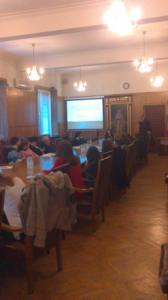HIGH-TECH BUSINESS CENTER OF SOFIA UNIVERSITY ST. KLIMENT OHRIDSKI
Faculty of Economics and Business Administration
Tsarigradsko Chaussee, Bl. 3, Room 120
Sofia, Bulgaria
Executive director: Prof. Dr.Sc. George Chobanov
E-mail: georgech@feb.uni-sofia.bg
E V E N T S :
20 March 2013, Faculty of Economics and Busines Administration, Sofia University
„Managing Innovation and Intellectual Property in the EU research programmes“
Training Event
Event Programme (pdf)
Presentations:
1. IP in EU-funded projects (pdf)
2. Exploitation of research results (pdf)
3. Establishing Successful Research Partnerships with European SMEs (pdf)
4. Въведение в патентите и полезните модели (pdf)
MISSION, VISION AND STRUCTURE
I. MISSION OF HIGH-TECH BUSINESS CENTERS AND VISION FOR AN ECONOMIC SYSTEM DEVELOPMENT
Before starting any enterprise we have to answer some basic questions:
- What do we intend to do?
- Why do we intend to do it? or Do we need to do it at all?
What do we intend to do?
The main objective of the High-Tech Business Center at Sofia University is to serve for knowledge transfer from (mainly but not only) Sofia University into (mainly but not only) the economy of Bulgaria.
The High-Tech Business Center at Sofia University intends to work in the world-wide developed cluster of science and technology parks, performing activities in the area of commercialization of scientific and technological products.
The High-Tech Business Center (HTBC) of Sofia University is a value driven enterprise, providing services for researchers, who like to implement into practice their ideas, knowledge and technological products.
Why do we intend to do it?
Knowledge transfer into an economic system is currently the most efficient way for growth and development.
Innovations as practical implementation of knowledge are driving force for economic and social development in human society.
Robert Solow considers technological innovations converted into capital goods as a driving force for economic growth.
“My own attempt to get at the same underlying intuition (also dating from the 1950s) was to study "vintage models" in which technological innovations can only be effective when they are "embodied" in new capital goods.” (Robert Solow, http://www.nobelprize.org/nobel_prizes/economics/laureates/1987/solow-lecture.html)
There is a good potential for scientific and technological products in Sofia University, in the Bulgarian Academy of Sciences and in other Bulgarian universities, but only a few of these products are implemented into practice.
The Bulgarian economy is suffering of low productivity and competitiveness doo mainly to missing innovations, but no institution or enterprises is actively involved in knowledge transfer into the economy. As a result, there are only a few innovative companies in Bulgaria.
How to encourage knowledge transfer? What is the natural environment for it?
Knowledge transfer means implementation of innovative products not only in the activities of enterprises, but in the economic system and its clusters as well.
Economic clusters are the natural environment for dissemination of knowledge and innovations. The “industrial districts” in England, described by Alfred Marshall are a good example for this, how economic clusters could influent the development of the whole economy.
The development of high-tech clusters is usually initiated by or at universities. The Silicon Valley cluster was initiated by professors at Stanford University, supporting two engineers William Hewlett and David Packard, who graduated at Stanford to start in Palo Alto their Hewlett-Packard company. A lot of high-tech clusters were initiated or started at Harvard University. Prof. Michael Porter being the Center for Competitiveness Director at Harvard is not occasionally world-wide leading researcher in the economic cluster theory. There is not very much chance for sustainable competitiveness of an enterprise or of an economy without innovation dissemination and knowledge transfer.
Economic Clusters
Cluster is a set of objects lying closer to each other. Closeness is determined by distance d(x,y) between objects x and y.
Economic cluster is a set of economic subjects (usually enterprises) being closer to each other with respect to geographic and economic distance, having channels for economic flows and for exchange of information. Mathematically, this is a graph: A set of objects with connections with each other.
The channels between the economic subjects build a network for exchange of information. The cluster’s network allows exchange of ideas and therefore propagation of knowledge. Exchange of ideas doubles knowledge. George Bernard Show:
If me and you have an apple and exchange it, everybody of us will one apple. If everybody of us has an idea and if we exchange them, everybody of us will have two ideas.
If an economic cluster has N members and everybody of them has one idea, then after exchanging their ideas, everybody will have N ideas.
II. TYPICAL STRUCTURE OF A HIGH-TECH BUSINESS CENTER
A High-tech business center, sometimes called science park or science and technology park usually consists of three departments:
- Patent Valuation Office (PVO)
- Business Incubator (BI)
- Innovation Lab (IL)
PATENT VALUATION OFFICE
Innovations are the key of enterprise’s success and sustainable development. For encouraging innovation’s implementation and for enterprise’s long term priorities, intellectual property rights protection is needed.
The High-Tech Business Center of Sofia University provides the services needed for intellectual property rights protection. The first step in doing this is patent registration. Patent registration states the property rights on the product registered.
Who owns a product developed in an university: the university, the researcher who developed it, or both? The property rights law varies in different countries:
In Germany: university owns 70%, researcher owns 30%
Additionally: The university takes over all the patent costs and the risks of its implementation, including marketing and transaction costs. The researcher has no cost, but 30% of the gross income from the patent. This scheme can be implemented in Bulgaria as well.
For Sofia University, all the activities for intellectual property rights protection mentioned above are provided in the Patent Valuation Office (PVO) of the High-Tech Business Center. If a researcher at Sofia University likes to use the intellectual rights protection services for his/her new (no patent registration and not announced publicly) product, then he/she has first to announce this product for patent registration valuation at the Patent Valuation Office (PVO). The experts of the PVO have to make valuation of the announcement for patent registration examining whether the product is yet patent registered and assessing patent ability and market chances of the product. The experts of the PVO take a decision to accept or reject the announcement for patent registration. In case, the announcement for patent registration is rejected, the university can not take any responsibility for it and the researcher could look for other way for property rights protection of the product. If experts of the PVO decide to accept the announcement for patent registration, then the High-Tech Business Center takes over all the responsibilities of intellectual property protection and transaction costs of the product according a special contract with the researcher.
BUSINESS INCUBATOR
A farther opportunity for implementation of innovative ideas into practice is a startup of own company. Bringing your innovative ideas alive by own! Be independent, fight for your success!
The High-Tech Business Center (HTBC) of Sofia University supports researchers who like to start own company in its Business Incubator (BI) or Startup Center (SC). The Startup Center (SC) serves like an incubator for newly born “baby” companies for a five years period, providing them with office space, accounting and marketing services at lower prices.
Starting up new innovative value based companies paves the way for economic growth and development in Bulgaria.
INNOVATION LAB
For creating an environment for innovative business thinking not only for university professors and researchers but for students and for interested parties outside Sofia University, the High-Tech Business Center has an Innovation Lab (IL).
Innovation Lab (IL) is organizing ones a week a seminar on Good Innovative Practices for sharing experience and exchanging ideas.
Innovation Lab (IL) offers to everybody who has an idea and likes to start own company a course on Setting up in Business concerning topics relevant for those founding a business, mainly matters dealing with general business economics. Supplementary courses on legal matters, financial backing or insurance and business plan development are given.





